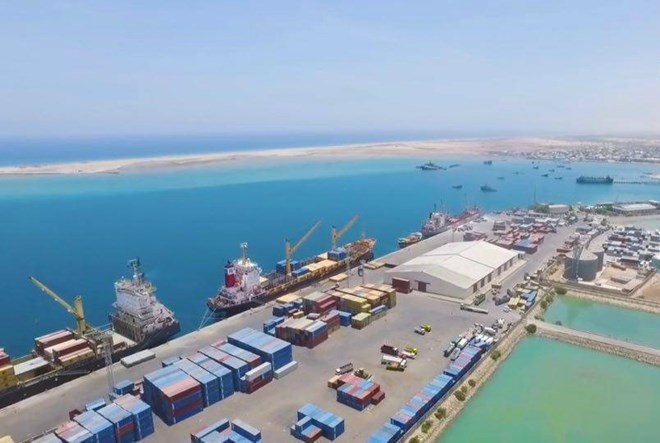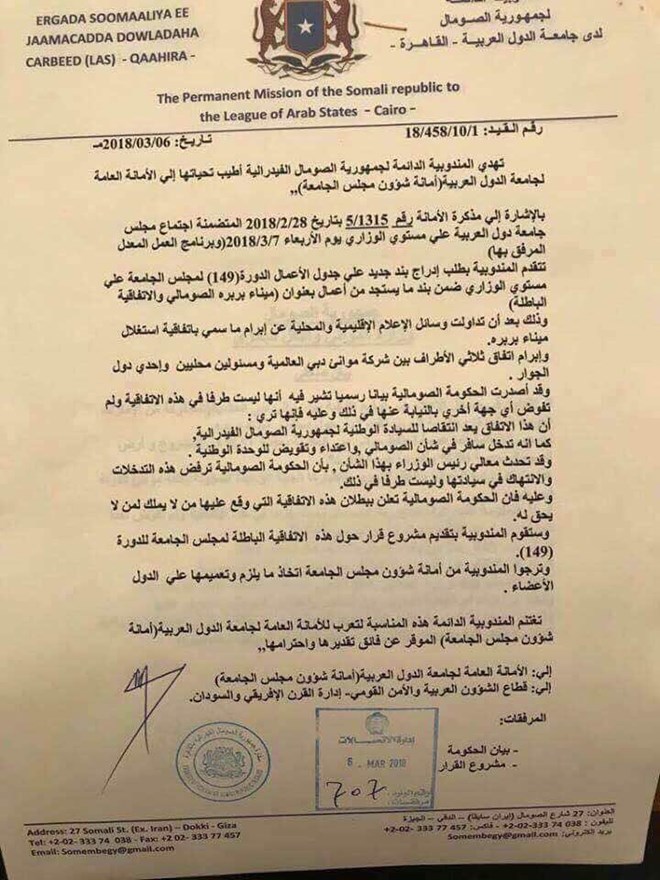Hiiraan Online
Thursday March 8, 2018
MOGADISHU (HOL) - The Federal Government of Somalia has asked the Arab League to step in and mediate in the Berbera port agreement after a week of back and forths between Somalia, Somaliland and Dubai-operated DP World have led to a deterioration in relations.
In a letter addressed to the regional organization of Arab states, the Federal Government of Somalia reiterates it's position that it was not a party to the tripartite agreement.
It adds that the agreement between DP World, Somaliland and Ethiopia directly undermines the unity and sovereignty of the Somali government by interfering Somalia's internal affairs.
In a bid to exhaust all diplomatic measures, a senior government official said that a similar complaint will be launched with the African Union, ostensibly directed at Ethiopia.
The incident was sparked by a tripartite agreement between Somaliland, Ethiopia and DP world to manage Berbera Port, calling the deal illegal and declaring it "null and void"
The agreement signed on Thursday gave DP World a 51% stake in the port and Ethiopia would acquire 19%. Somaliland Port Authority will retain 30%.
In a statement dated March 2nd, Somalia's Ministry for Ports and Marine Transport challenged the legality of the deal saying the agreement is a threat to the unity and sovereignty of Somalia.
“The so-called agreement is both defective and detrimental to the sovereignty of the Federal Republic of Somalia. The ministry, therefore, considering the above declares this deal as non-existent null and void” the Ministry said.

The complaint letter sent to the Arab League on behalf of the Federal Government of Somalia.
Somalia's Prime Minister Hassan Ali Khaire reiterated the government's position on his Twitter account on last Friday.
"As National leaders we do not take the responsibility of protecting Somalia’s unity, sovereignty and independence lightly. The FGS is committed and determined to protecting [sic] this responsibility in accordance with our constitution."
The three-way-deal was signed while Somali PM Hassan Ali Khaire was on a state visit to the UAE. It is unclear if he voiced his concerns with the Emirati's.
The Somaliland Government quickly refuted claims by Somalia nullifying an agreement.
The Somaliland Minister of Information, Abdirahman Abdillahi Farah, said in a statement that the government of President Musa Bihi Abdi worked on the agreement with DP World and the Government of Ethiopia, adding that the Republic of Somaliland is a “sovereign and independent and does not allow others to prejudice its sovereignty”.
“The present agreement is nothing new,” Muse Bihi Abdi, president of Somaliland said in a statement on Saturday. “It is an extension of the agreement entered into between the Republic of Somaliland and DP World and approved by the Parliament.”
DP World CEO Sultan Ahmed bin Sulayem said a television interview that Federal Government of Somalia is powerless with regards to Berbera port agreement reached with Somaliland and Ethiopia. He argued that Somaliland has been “independent” from Somalia for 28 years and its parliament approved the deal.
Officially, no nation, including the United Arab Emirates, recognizes Somaliland's independence.
During a high-level international meeting focused on Somalia in London this week, Qatar's director of the International Technical Co-operation Department, Tariq Ali al-Ansari, called for all parties to support the unity, and territorial integrity of Somalia and respect for its sovereignty in accordance with the resolutions of the UN General Assembly, the Security Council, the Arab League and the African Union.
Berbera port was officially opened in 1968 and was used primarily as a naval and missile base for the Somali government. The port was upgraded by Soviet authorities in 1972 following a military pact with the USSR. It was expanded once more during the cold war by the U.S. military after Somali authorities switched sides and thawed relations with Americans.